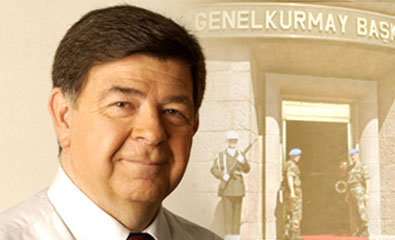The Turkish Armed Forces' Dignity is at Stake
 Last week's biggest news story in the Turkish press was about the military document leaked to the liberal Taraf daily last Friday. The document was seized by the police at the office of a retired lieutenant who had a medal for superior military service.
Last week's biggest news story in the Turkish press was about the military document leaked to the liberal Taraf daily last Friday. The document was seized by the police at the office of a retired lieutenant who had a medal for superior military service.
The lieutenant, Serdar Öztürk, was arrested as part of the Ergenekon investigation ― an investigation into a clandestine criminal organization charged with conspiring to overthrow the elected government ― while serving as a defense lawyer for a retired general on trial in the same case.
The document, titled "Action Plan to Fight Reactionaryism," was prepared by an office of the General Staff of the Turkish Armed Forces (TSK) formerly called the "Psychological Warfare Department" as recently as in April 2009; just two months ago. The action plan, which claims that "groups of religious reactionaries" are exploiting the Ergenekon case to tarnish the image of the TSK, stipulates the measures to be taken to "inform the public of the facts that concern the Justice and Development Party [AK Party] government, who dreams of establishing an Islamic state based on Shariah law and various radical religious groups, primarily the Fethullah Gülen group, which support that government."
The measures prescribed included using agents within the media and the AK Party to help discredit and split the AK Party government and to spread news that would provoke public feelings against Armenia and Greece with a view to broaden the support of the nationalist opposition parties. The actions to be taken against the Gülen movement included not only smear campaigns in the media depicting the movement as being against the TSK so as to provoke even conservative Muslims to turn against it, but it also called for the planting of arms and ammunition on the premises of the educational institutions affiliated with the Gülen movement, which were to be discovered in military raids. It would then be possible to declare the movement a terrorist organization and to launch an investigation against it which would be carried out by military prosecutors.
It is perhaps needless to point to the fact that the AK Party government, against which the military's "psychological warfare" is to be conducted, has the broad support of the people of Turkey, having garnered not less than 47 percent of the vote in the latest parliamentary elections two years ago. It is also the government which has initiated the democratizing and liberalizing reforms that led to the start of accession negotiations with the European Union in 2005. It is perhaps also needless to point to the fact that the faith-based social movement inspired by the religious scholar Fethullah Gülen, against which the military's "psychological warfare" is to be conducted, preaches a modernist, tolerant, pro-secular and pro-democratic interpretation of Islam, a kind of Islam that does not deserve demonization, but respect. It sponsors schools which establish cultural bridges between Turkey and not less than 115 countries and media outlets such as this English language daily newspaper.
The "action plan" clearly constitutes a gross crime against all notions of the rule of law and democracy. The spokesperson for the General Staff has declared that there will be an immediate military investigation into all aspects of the affair, concerning both the existence of the document and how it ended up in the office of a former lieutenant who is now under arrest due to the Ergenekon investigation.
There are strong reasons to believe that the document is genuine, since it is by no means the first case of a defamation and disinformation campaign directed against unapproved of journalists and civil society groups by the "psychological warfare" authorities of the military. All those who support democracy and the rule of law demand that a swift investigation into the affair. They also demand that those responsible do not this time go unpunished like in the previous cases.
The whole incident reveals, before anything else, how a perverse notion of secularism, which has no respect for the rule of law and democracy and regards all manifestations of religiosity as inimical to the state, is widespread among the ranks of the military. Secondly, it shows how the self-appointed role of the military as the guardian of the "secular and unitary nature of the regime" in Turkey is corrupting the integrity of the institution and increasingly alienating it from the vast majority of the people.
The sooner the military high command understands that the political role of the military is slowly but surely decaying the credibility and trustworthiness of the armed forces and takes measures necessary to establish the principles of respect for civil liberties, the rule of law and democracy among the ranks, the better it will be for both the country and the military as an institution. Clearly the Turkish Armed Forces' dignity is at stake.
- Created on .